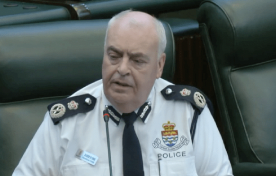Police Commissioner Derek Byrne has admitted that law enforcement has not been doing enough to address the escalating problem of gambling, which he said is both fuelling and directly linked to other crimes. Byrne said the RCIPS needs to do more, but that community-wide tolerance of illegal gambling and inadequate consequences for anyone who commits this offence has undermined police efforts. But if more had been done, the situation may not have become as bad as it is now, he said.
Appearing on Thursday before the Parliamentary Select Committee on the Gambling (Amendment) Bill 2022, Byrne explained to MPs why he had been raising his concerns since he arrived here six years ago about the inadequate consequences relating to gambling offences, and why he had made recommendations to increase the penalties as a way of deterring people in the gambling business.
Byrne said that illegal gambling generated a significant and worrying amount of serious crime, such as money laundering and robberies, and that young people were being sucked into the crime world because they worked as mules for organised criminals. It was linked to drugs, guns, work permit infractions and many other crimes, he said.
But when questioned by Kenneth Bryan (GTC), the police commissioner accepted that gambling was already illegal and the police could have done more to arrest those who are running illegal gambling operations. He admitted that the crime associated with it, from extortion to immigration offences, as well as the gambling itself, was “happening in plain sight”, especially in the area of Eastern Avenue in George Town.
Although the CoP was unable to tell Bryan how many arrests for gambling had been made over the past year, he said it was “very few”, but that the police were focused on the organised crime associated with it.
Byrne told MPs that a few people were making a lot of money from the wide cross-section of society playing numbers. As previously reported, the authorities believe that the illegal gambling sector is worth around $30-50 million per year, which the commissioner said was a conservative estimate. But the combination of inadequate laws and high community tolerance meant the police were not combating the actual illegal gambling, though he denied that this was because the RCIPS simply accepted that gambling was just a thing that happened.
“I am saying we could be doing more,” Byrne said but claimed that limited powers and an outdated law had led to that lack of enforcement. He said he didn’t think people really understood how much other serious crime is associated with gambling. Even though he accepted that the only change in the proposed amendment bill was an increase in the penalties, he said that if it passed, it would see the RCIPS put more resources into clamping down.
“I would certainly do an awful lot more if I thought the appropriate… or proportionate response was there,” he said. “We are not doing enough to address all of these concerns, or we wouldn’t have had a murder, we wouldn’t have the level of extortion or the level of robberies that we have,” the commissioner conceded.
Former premier and opposition member Sir Alden McLaughlin (RED) also raised concerns about the bill and what the commissioner was hoping to achieve. During the debate in parliament at the end of last year, McLaughlin had said the only thing the bill would do was criminalise ‘little old ladies”, a position he repeated Thursday after pointing out that one of the main demographics playing numbers was elderly Caymanians hoping to win a little something to supplement their meagre pensions.
McLaughlin asked the commissioner if, given how entrenched the numbers game is in the Cayman Islands, he believed it would be better to seek to legalise and then regulate gambling rather than ramping up the penalties. He noted that this “would bite hardest” on the retirees who hope to win a few hundred dollars rather than those who sell the numbers and are heading up the criminal organisations.
Increasing fines up to $10,000 would not result in many of the sellers coming before the courts “as they are far more savvy”, he said. “What we are more likely to see, as has been the case in the distant past, is little old ladies or elderly gentlemen being charged with… buying a number, and I am afraid that we are going to put in place… some secure retirement homes as you can’t put these people in jail.”
McLaughlin said this was a big concern. “We need to find a way to avoid penalising some of the most vulnerable in this community who are operating on small fixed incomes,” he said. “It seems to me to be beyond wrong to seek to penalise further ordinary people.” Instead, he said, the government should regulate the numbers games and avoid the criminal element — a position that appears to be now shared by several other MPs.
During the afternoon session, MPs attempted to navigate how a select committee actually works and how they should approach amending the legislation. However, as it appeared that both government and opposition members supported putting this law on hold at least until after the planned referendum on a legalised lottery, or even withdrawn altogether, Premier Wayne Panton agreed to adjourn the committee.
He said time was needed to discuss the ideas being put forward to delay the proposed bill and where PACT now stands on the broader issue.




